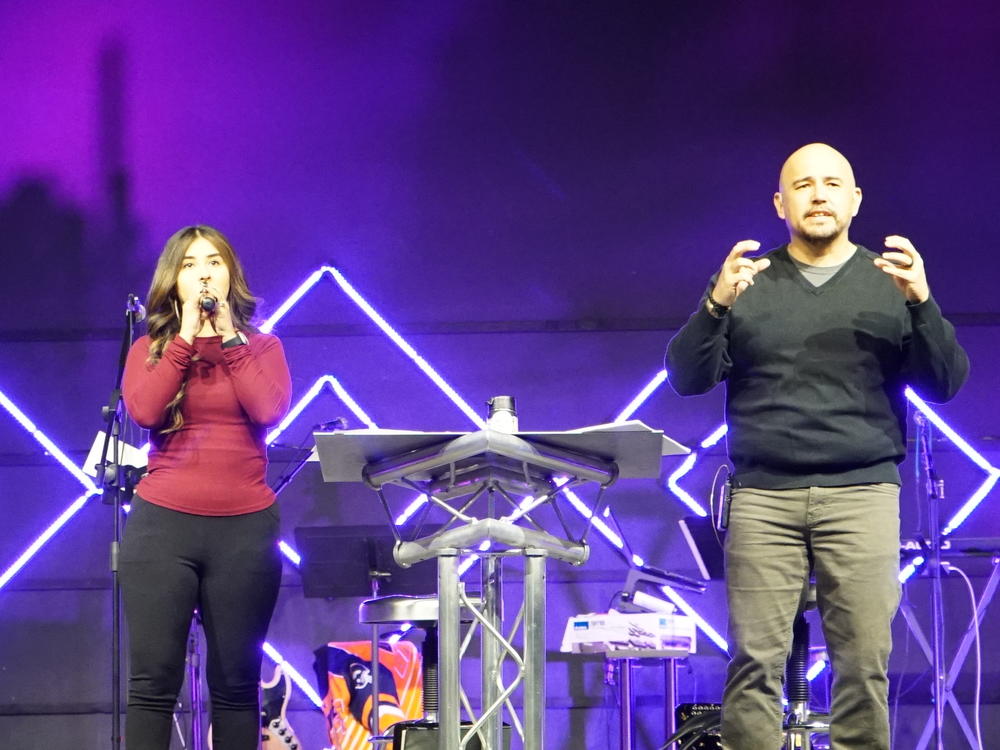Section Branding
Header Content
'Manage The Best We Can': Latino Church Adapts To New COVID-19 Reality
Primary Content
In a commercial building in Weld County, Colo., a band is jamming and singing about Jesus. The stage is backlit by purple, fluorescent diamond-shaped lights. Worshippers, who are socially distanced and wearing masks, stand and sway to the music. Some sing along.
This is Mosaic Church.
Every Sunday there are three services, two in English and one in Spanish. Angel Flores is Mosaic's lead pastor and on this day, his message is about the spirit of giving.
"We're going to talk about generosity," he says in English while one of the singers translates his words into Spanish.
During the service, as the pastor shares a funny anecdote about his bad singing voice, his warm smile grows.
"If I sing, you won't worship God," he says as the congregation laughs.
Angel and his wife, Diane Flores, are Mexican American, and founded Mosaic Church 13 years ago with a group of friends in their kitchen.
"We felt like there was an opportunity to create a church for unchurched people," he said. "Our original tagline was a church for people who don't really like church."
"We strive to make Mosaic as welcoming, unweird, as we can," she said. "You can invite your friends."
Mosaic is an evangelical Christian congregation and has lots of young, working class families. A year ago, nearly 700 people would come worship on any given Sunday. Then the pandemic began and congregants who are first responders or work at meat packing plants started getting sick.
Church members reached out to the Flores for support.
"We got a call from a lady in our church who said, 'Pastor, they're about to intubate me,'" Angel said. "As her pastor, I'm telling her, like, 'look, it's going to be OK, you're going to be fine. But real talk, you might be meeting the Lord soon. So, let's, you know, let me pray with you.'"
Thankfully, she survived.
During the first wave of coronavirus, about two dozen congregants got COVID-19 and recovered. But, as a precaution, the church shut its doors in mid-March and moved online.
Lack of official guidance
"One of the unique challenges that we had here in Weld County was our commissioners," Angel said. "They don't recognize the validity of any of any [Colorado] Governor Polis' rules."
Throughout the pandemic, Weld County Commissioners have not enforced the state's COVID-19 regulations. They've encouraged personal responsibility instead, telling residents and businesses they can decide for themselves which precautions to follow, if any.
Latinos across the country have been hard hit by COVID-19. This trend is playing out in Weld County. Here Hispanics and Latinos make up 30% of the population but accounted for about 40% of cases last year.
"I think that takes a mental toll on the community," Angel said. "Everybody's stressed out. Everybody's tired of this. Everybody's worn out."
Over the summer, Angel and Diana decided to restart in-person services. They were determined to do it safely but didn't know how.
"We didn't have any guidelines from our local government on how to do this," Angel said. "So, we kind of had to figure it out on our own."
They chose to follow guidelines from neighboring Larimer County.
In mid-June, Mosaic Church began worshipping again in person at a greatly reduced capacity while continuing to stream services online. They removed every other row of chairs and asked people to leave space between families.
"We ask everybody to wear masks. We bought gallons of hand sanitizer," he said. "We're just trying to manage it the best we can."
Refuge in difficult times
Dorothy Meza has been a member of Mosaic for about four years. She leaned on the church after five of her family members contracted the coronavirus.
"Mosaic Church has just been a very huge just support emotionally," she said.
Meza watched the services on Facebook, but it was not the same. She felt adrift, disconnected from the congregation.
"Like if we're in the middle of the ocean with no paddling boards," she said. "The church family is like, they're the ones that help us paddle and stay on track."
Eventually, Meza was able to return to the actual church building.
Mosaic got into a good weekly routine for about five months. However, church members kept contracting the disease. And Pastor Flores had three of his own family members pass away from COVID-19 in one week.
At the beginning of November, Angel tested positive for the coronavirus.
"I'm so bummed out to tell you this is happening to me," he said in a video he posted on Mosaic's Facebook page. "Because the last thing I wanted to do was bring this into my house and to bring this into my church family."
Diane also tested positive along with several church staff members. So, the congregation had to close again. It was, however, able to reopen in time for Christmas.
The new normal
In his Facebook message, Angel urged the congregation to remain diligent and stay safe.
"If you're feeling sick, like get tested. This is serious, this whole COVID thing is not a joke," he said. "I don't care what anybody says about the politics behind it or any of that ridiculous stuff, it's real and it's terrible. And I'm thankful that I seem to have gotten a mild case of it.
Mosaic now continues to worship both online and in-person. Even though their ministry has changed, Angel and Diane Flores plan to keep doing what they do, helping people grow their faith while also keeping them safe.
"Once we get through this," he said. "I know I'm going to appreciate worshipping with other people more than I ever have. Gathering with family, hugging people, shaking hands."
"I think our main focus during COVID is to provide hope for people," she said. "Remind them that this will pass," she said.
Copyright 2021 KUNC. To see more, visit KUNC.

